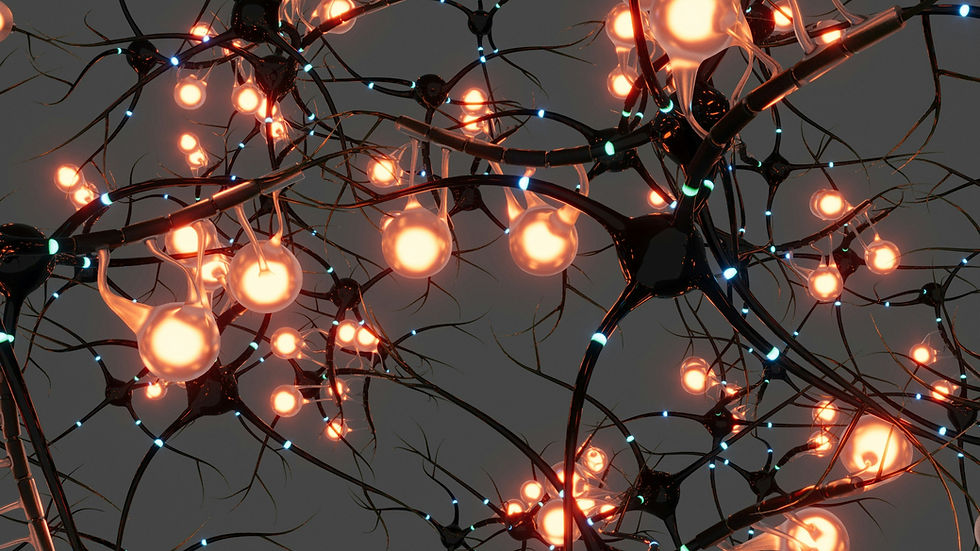Perimenopause and Your Skin: Understanding the Changes and Adapting Your Skincare Routine
- Sienna Jay

- Mar 18, 2025
- 4 min read

Perimenopause brings shifts that can take many women by surprise, especially when it comes to their skin. As oestrogen declines, dryness, sensitivity, and even unexpected breakouts can emerge. Understanding these changes is key to adapting your skincare routine and keeping your complexion healthy and resilient.
Skin Dryness and Dehydration
The reduction in oestrogen during perimenopause reduces the skin's ability to retain moisture, leading to dryness and a loss of elasticity. This can result in a rough texture and the appearance of fine lines. Oestrogen plays a crucial role in maintaining skin hydration by stimulating the production of natural oils and collagen. As levels decline, the skin becomes thinner and more prone to dehydration.
To combat this, hydration becomes crucial. Drinking plenty of water and consuming hydrating foods such as cucumbers, watermelon, and oranges can help maintain moisture levels. Topical hydration is also essential, moisturisers containing hyaluronic acid and ceramides can significantly improve the skin’s ability to retain moisture and reinforce its barrier function.
Increased Sensitivity
Hormonal changes can weaken the skin, making it more susceptible to irritation from products that were previously well-tolerated. Many women experience heightened sensitivity during perimenopause, which may manifest as redness, itching, or a burning sensation.
Switching to gentle, fragrance-free skincare products can help soothe irritation. Look for ingredients such as aloe vera, chamomile, and oat extract, which have calming properties. Avoid harsh exfoliants, alcohol-based toners, and synthetic fragrances, as these can cause sensitivity.
Adult Acne and Breakouts
Fluctuations in hormone levels can lead to an increase in oil production, resulting in clogged pores and acne breakouts. This can be particularly frustrating for those who have not experienced acne in the past.
A balanced skincare routine can help manage breakouts without over-drying or irritating the skin. Opt for gentle cleansers and moisturisers that hydrate while preventing clogged pores. Ingredients such as niacinamide can help reduce inflammation and regulate oil production. Additionally, using gentle exfoliants containing lactic acid or polyhydroxy acids (PHAs) can help keep pores clear without causing excessive dryness.
Your Four Step Skincare Routine
Hydration
One of the most important steps in perimenopausal skincare is hydration. As skin loses its natural ability to retain moisture, it becomes essential to replenish it with hydrating ingredients.
Hyaluronic Acid: This powerhouse ingredient attracts and retains moisture, keeping the skin plump and smooth.
Ceramides: These lipid molecules help restore the skin’s natural barrier, preventing moisture loss and enhancing resilience.
Glycerin: Known for its ability to draw water into the skin, glycerin helps keep the complexion hydrated throughout the day.
Gentle Cleansing
As skin becomes more sensitive during perimenopause, using a mild cleanser is essential to remove impurities without stripping away essential oils.
Opt for cream-based or gel cleansers that are free from harsh surfactants.
Avoid foaming cleansers with sulfates, as these can exacerbate dryness and irritation.
Look for soothing ingredients like chamomile, aloe vera, and oat extract.
Sun Protection
Daily sun protection is crucial at any age, but it becomes even more important during perimenopause. Declining oestrogen levels make the skin more vulnerable to UV damage, leading to premature ageing, hyperpigmentation, and further collagen breakdown.
Use a broad-spectrum SPF 30+ sunscreen every morning.
Opt for formulas containing antioxidants such as vitamin C and E for added protection against environmental damage.
Reapply sunscreen throughout the day, especially if spending extended time outdoors.
Targeted Treatments for Specific Concerns
Targeted treatments can help address specific skin concerns, from ageing to sensitivity. Choosing the right ingredients can improve skin texture, elasticity, and overall health.
Retinoids: Retinoids stimulate collagen production and improve skin texture. If prescription-strength retinoids are too harsh, opt for gentler alternatives such as retinol or bakuchiol.
Peptides: These help improve skin elasticity and firmness, making them excellent additions to an anti-ageing skincare routine.
Niacinamide: This vitamin B3 derivative helps reduce redness, inflammation, and oil production, making it beneficial for both acne and sensitivity concerns.
Supporting Skin Health Beyond Skincare
Diet and Hydration
What you eat has a direct impact on your skin’s appearance and resilience. A nutrient-dense diet rich in essential vitamins, minerals, and antioxidants can help counteract the effects of hormonal changes.
Omega-3 Fatty Acids: Found in salmon, flaxseeds, and walnuts, omega-3s help reduce inflammation and keep the skin supple.
Antioxidants: Foods like blueberries, spinach, and nuts protect against oxidative stress and premature ageing.
Collagen-Boosting Foods: Citrus fruits, bell peppers, and leafy greens can help support collagen production, keeping the skin firm.
Stress Management and Sleep
Chronic stress can elevate cortisol levels, which in turn can exacerbate skin issues like breakouts, sensitivity, and dryness. Finding healthy ways to manage stress is crucial for maintaining skin health.
Engage in relaxation techniques such as meditation, yoga, or deep breathing exercises.
Spend time outdoors! Nature has been shown to reduce stress levels and promote well-being.
Prioritise quality sleep. Aim for 7-8 hours per night, as this is when the body undergoes repair and regeneration.
When to Seek Professional Advice
If skin changes become severe or significantly impact your quality of life, consulting a dermatologist can provide you with tailored advice. Some advanced treatments that may help include:
Polynucleotide injections: These boost hydration and improve skin elasticity.
Platelet-Rich Plasma (PRP) therapy: Helps rejuvenate the skin and promote collagen production.
Hormone replacement therapy (HRT): For some women, HRT can help mitigate the effects of declining oestrogen on the skin.
Embracing Change with Confidence
Perimenopause reshapes your skin in ways that may feel unfamiliar, but with the right approach, you can stay ahead of the changes. A targeted skincare routine, smart lifestyle choices, and expert-backed solutions can help you maintain a strong, healthy complexion. This phase is not just about adapting, it is an opportunity to prioritise your skin’s health and embrace a new era of confidence.




Comments